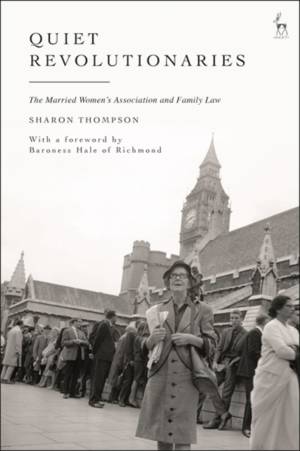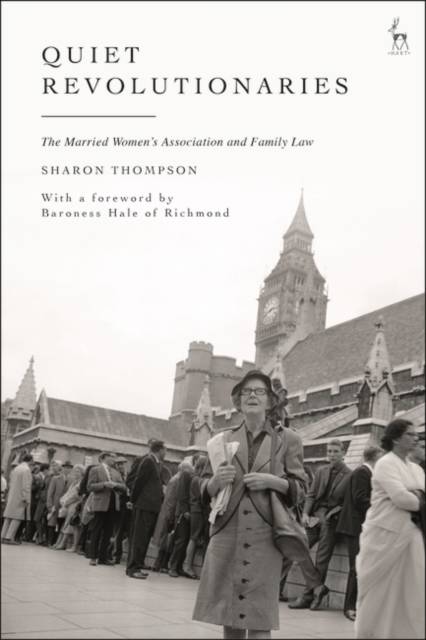
- Afhalen na 1 uur in een winkel met voorraad
- Gratis thuislevering in België vanaf € 30
- Ruim aanbod met 7 miljoen producten
- Afhalen na 1 uur in een winkel met voorraad
- Gratis thuislevering in België vanaf € 30
- Ruim aanbod met 7 miljoen producten
Zoeken
Quiet Revolutionaries
The Married Women's Association and Family Law
Sharon Thompson
Hardcover | Engels
€ 203,95
+ 407 punten
Uitvoering
Omschrijving
This book tells the untold story of the Married Women's Association. Unlike more conventional histories of family law, which focus on legal actors, it highlights the little-known yet indispensable work of a dedicated group of life-long activists.
Formed in 1938, the Married Women's Association took reform of family property law as its chief focus. The name is deceptively innocuous, suggesting tea parties and charity fundraisers, but in fact the MWA was often involved in dramatic confrontations with politicians, civil servants, and Law Commissioners. The Association boasted powerful public figures, including MP Edith Summerskill, authors Vera Brittain and Dora Russell, and barrister Helena Normanton. They campaigned on matters that are still being debated in family law today.
Quiet Revolutionaries sheds new light upon legal reform then and now by challenging longstanding assumptions, showing that piecemeal legislation can be an effective stepping stone to comprehensive reform and highlighting how unsuccessful bills, though often now forgotten, can still be important triggers for change. Drawing upon interviews with members' friends and family, and thousands of archival documents, the book is compulsory reading for lawyers, legal historians, and anyone who wishes to explore histories of law reform from the ground up.
Formed in 1938, the Married Women's Association took reform of family property law as its chief focus. The name is deceptively innocuous, suggesting tea parties and charity fundraisers, but in fact the MWA was often involved in dramatic confrontations with politicians, civil servants, and Law Commissioners. The Association boasted powerful public figures, including MP Edith Summerskill, authors Vera Brittain and Dora Russell, and barrister Helena Normanton. They campaigned on matters that are still being debated in family law today.
Quiet Revolutionaries sheds new light upon legal reform then and now by challenging longstanding assumptions, showing that piecemeal legislation can be an effective stepping stone to comprehensive reform and highlighting how unsuccessful bills, though often now forgotten, can still be important triggers for change. Drawing upon interviews with members' friends and family, and thousands of archival documents, the book is compulsory reading for lawyers, legal historians, and anyone who wishes to explore histories of law reform from the ground up.
Specificaties
Betrokkenen
- Auteur(s):
- Uitgeverij:
Inhoud
- Aantal bladzijden:
- 280
- Taal:
- Engels
Eigenschappen
- Productcode (EAN):
- 9781509929412
- Verschijningsdatum:
- 8/09/2022
- Uitvoering:
- Hardcover
- Formaat:
- Genaaid
- Afmetingen:
- 156 mm x 234 mm
- Gewicht:
- 571 g

Alleen bij Standaard Boekhandel
+ 407 punten op je klantenkaart van Standaard Boekhandel
Beoordelingen
We publiceren alleen reviews die voldoen aan de voorwaarden voor reviews. Bekijk onze voorwaarden voor reviews.








